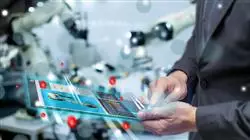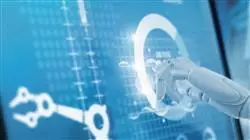University certificate
The world's largest faculty of engineering”
Introduction to the Program
Boost your professional profile with new knowledge and skills in Industrial Robotics and Cyberphysical Systems"

Society is undergoing a new process of change, considered to be the Fourth Industrial Revolution, in which the digitization and Automation of processes and tools are the protagonists. The Industrial Internet of Things (IIoT) consists of a network of physical objects (“things”) that incorporate sensors, software and other technologies in order to connect and exchange data with other devices and systems, through the internet. Their usefulness and growing demand is such that professionals with advanced knowledge in this field are increasingly needed.
For this reason, TECH has designed a Postgraduate diploma in Industrial Internet of Things (IIoT) with which it seeks to provide students with new skills and better competences in this area, with which to ensure a successful future in this area of engineering with such potential. Therefore, the content addresses topics such as Cyberphysical Systems, Security in IoT and IIoT Platforms, Industrial Robotics and the Smart Factory Principles.
All this, in a comfortable 100% online mode that allows students to carry out their studies without being affected by their other day-to-day work, having total freedom of organization. In addition, it offers the most up-to-date, dynamic and comprehensive theoretical and practical contents of the labor market.
Get precise and complete knowledge about the Smart Factory, through video reports, videos in detail or specialized readings"
This Postgraduate diploma in Industrial Internet of Things (IIoT) contains the most complete and up-to-date program on the market. The most important features include:
- The development of practical cases presented by experts in Industrial Internet of Things
- The graphic, schematic, and practical contents with which they are created, provide scientific and practical information on the disciplines that are essential for professional practice
- Practical exercises where self-assessment can be used to improve learning
- Its special emphasis on innovative methodologies
- Theoretical lessons, questions to the expert, debate forums on controversial topics, and individual reflection assignments
- Content that is accessible from any fixed or portable device with an Internet connection
This 100% online Postgraduate diploma will allow you to balance your IIoT studies with your work. You choose where and when to access"
The program’s teaching staff includes professionals from the field who contribute their work experience to this educational program, as well as renowned specialists from leading societies and prestigious universities.
The multimedia content, developed with the latest educational technology, will provide the professional with situated and contextual learning, i.e., a simulated environment that will provide immersive education programmed to learn in real situations.
This program is designed around Problem-Based Learning, whereby the professional must try to solve the different professional practice situations that arise during the academic year For this purpose, the students will be assisted by an innovative interactive video system created by renowned and experienced experts.
Become an IIoT expert in just a few months and in a 100% online mode"

Acquire new competencies in industrial automation and PLC systems"
Why study at TECH?
TECH is the world’s largest online university. With an impressive catalog of more than 14,000 university programs available in 11 languages, it is positioned as a leader in employability, with a 99% job placement rate. In addition, it relies on an enormous faculty of more than 6,000 professors of the highest international renown.

Study at the world's largest online university and guarantee your professional success. The future starts at TECH”
The world’s best online university according to FORBES
The prestigious Forbes magazine, specialized in business and finance, has highlighted TECH as “the world's best online university” This is what they have recently stated in an article in their digital edition in which they echo the success story of this institution, “thanks to the academic offer it provides, the selection of its teaching staff, and an innovative learning method aimed at educating the professionals of the future”
A revolutionary study method, a cutting-edge faculty and a practical focus: the key to TECH's success.
The most complete study plans on the university scene
TECH offers the most complete study plans on the university scene, with syllabuses that cover fundamental concepts and, at the same time, the main scientific advances in their specific scientific areas. In addition, these programs are continuously being updated to guarantee students the academic vanguard and the most in-demand professional skills. In this way, the university's qualifications provide its graduates with a significant advantage to propel their careers to success.
TECH offers the most comprehensive and intensive study plans on the current university scene.
A world-class teaching staff
TECH's teaching staff is made up of more than 6,000 professors with the highest international recognition. Professors, researchers and top executives of multinational companies, including Isaiah Covington, performance coach of the Boston Celtics; Magda Romanska, principal investigator at Harvard MetaLAB; Ignacio Wistumba, chairman of the department of translational molecular pathology at MD Anderson Cancer Center; and D.W. Pine, creative director of TIME magazine, among others.
Internationally renowned experts, specialized in different branches of Health, Technology, Communication and Business, form part of the TECH faculty.
A unique learning method
TECH is the first university to use Relearning in all its programs. It is the best online learning methodology, accredited with international teaching quality certifications, provided by prestigious educational agencies. In addition, this disruptive educational model is complemented with the “Case Method”, thereby setting up a unique online teaching strategy. Innovative teaching resources are also implemented, including detailed videos, infographics and interactive summaries.
TECH combines Relearning and the Case Method in all its university programs to guarantee excellent theoretical and practical learning, studying whenever and wherever you want.
The world's largest online university
TECH is the world’s largest online university. We are the largest educational institution, with the best and widest online educational catalog, one hundred percent online and covering the vast majority of areas of knowledge. We offer a large selection of our own degrees and accredited online undergraduate and postgraduate degrees. In total, more than 14,000 university degrees, in eleven different languages, make us the largest educational largest in the world.
TECH has the world's most extensive catalog of academic and official programs, available in more than 11 languages.
Google Premier Partner
The American technology giant has awarded TECH the Google Google Premier Partner badge. This award, which is only available to 3% of the world's companies, highlights the efficient, flexible and tailored experience that this university provides to students. The recognition as a Google Premier Partner not only accredits the maximum rigor, performance and investment in TECH's digital infrastructures, but also places this university as one of the world's leading technology companies.
Google has positioned TECH in the top 3% of the world's most important technology companies by awarding it its Google Premier Partner badge.
The official online university of the NBA
TECH is the official online university of the NBA. Thanks to our agreement with the biggest league in basketball, we offer our students exclusive university programs, as well as a wide variety of educational resources focused on the business of the league and other areas of the sports industry. Each program is made up of a uniquely designed syllabus and features exceptional guest hosts: professionals with a distinguished sports background who will offer their expertise on the most relevant topics.
TECH has been selected by the NBA, the world's top basketball league, as its official online university.
The top-rated university by its students
Students have positioned TECH as the world's top-rated university on the main review websites, with a highest rating of 4.9 out of 5, obtained from more than 1,000 reviews. These results consolidate TECH as the benchmark university institution at an international level, reflecting the excellence and positive impact of its educational model.” reflecting the excellence and positive impact of its educational model.”
TECH is the world’s top-rated university by its students.
Leaders in employability
TECH has managed to become the leading university in employability. 99% of its students obtain jobs in the academic field they have studied, within one year of completing any of the university's programs. A similar number achieve immediate career enhancement. All this thanks to a study methodology that bases its effectiveness on the acquisition of practical skills, which are absolutely necessary for professional development.
99% of TECH graduates find a job within a year of completing their studies.
Postgraduate Diploma in Industrial Internet of Things (IIoT)
The Internet of Things (IoT) is an increasingly perceptible reality in our daily lives. The frequent use of smart devices in which software, sensors and electronics are integrated to store data and connect to a network is evidence of a highly transformative landscape. This has a significant impact on the industrial sector and its development dynamics. For this reason, it is necessary that these professionals have an updated and specialized knowledge that allows them to know how to proceed and optimize processes in this area. Taking into account this emerging context and the new trends that exist in the industrial sector, TECH Global University designed this Postgraduate Diploma Industrial Internet of Things (IIoT), which aims to provide the best knowledge and content to prepare its students to face the challenges present in today's working life.
Become a professional specialized in digital transformation
If one of your goals as an Engineering professional is to visualize, innovate and be part of the future of new technologies and methodologies applied to Industry 4.0 in the digitalization market, this program is for you. The curriculum will allow you to recognize and analyze the profound paradigm shift that is being experienced globally, master the procedures of digitization and automation in the industrial sector and bring your knowledge, techniques or tools to assist companies in the challenges they face. In this way, you will be able to lead the digital change and become an indispensable piece for this area of expertise.
Postgraduate Diploma in the largest digital university in the world
At TECH Global University we have the most updated and complete content in the educational market for the study of IoT. Our education methods will be able to provide you with techniques, strategies and resources that will favor the performance of your work through accessible programs that respond to the particular needs of each student. In that sense, experts in the field will guide you to strengthen your skills and competencies.







